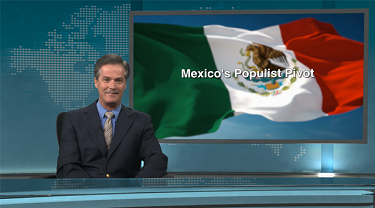Mexico’s populist pivot
How will AMLO steer the Mexican economy?

It was truly a landslide. Mexicans went to the polls last weekend, and spoke loudly for change. The man from the left who had campaigned 15 years for this role finally pulled it off. From before the election had officially begun, Andres Manuel Lopez Obrador – commonly known as AMLO – owned a commanding lead in the polls that only grew toward election day. Opposing candidates hoped until the end for a turn of their fortunes, but instead conceded defeat in record time as voting stations closed. What does Mexico’s political about-face mean for trade and economic stability?
With 94 per cent reporting, AMLO captured 53 per cent of the vote for president, well ahead of second-place PAN candidate Anaya. But this wasn’t just a decision for president. This Mexican ‘super-election’ also saw ballots cast for senate and the chamber of deputies, with hundreds of positions up for grabs. Experts predicted that even in the event of an AMLO victory, other parties would dominate both levels, limiting AMLOs ability to manoeuvre. In contrast, AMLO’s coalition also took a commanding lead in the senate, with the results very similar to the presidential tally. For the chamber of deputies, the result was even more stunning. Of the 300 available seats, the AMLO coalition grabbed an estimated 210, or 70 per cent. This essentially hands the keys for policy-making and implementation to the president-elect, and it seems the world is waiting with bated breath to see what he will now do.
Financial markets are nervous. The peso has moved both up and down, and the same goes for the IPC stock market index, leading up to and following AMLO’s victory. Further volatility is likely, for two main reasons. First, this election marks a radical break from the past. It is the first time in the 20-year period that followed the ‘first party rule’ system that a non-traditional party has been elected. It adds Mexico to a growing list of countries where economic and social frustration is breeding populist uprisings, upending traditional systems. Things are suddenly less predictable, jolting financial markets.
Second, AMLO has a long history of left-wing and anti-trade policy pronouncements that in the past scared voters off. The resounding mandate now has markets trying to anticipate what key moves the man some critics have called ‘Mexico’s Hugo Chavez’ will actually make. Campaign promises include pledges to increase social spending, reduce Mexico’s reliance on international trade, roll back the significant reforms that opened up the energy sector to foreign investment, and assistance for the agriculture sector in the form of subsidies and greater protection. As undiminished as AMLO’s campaign-trail anti-corruption stand was, it was light on tangible policy measures.
In the hours following his victory, AMLO’s tone was conciliatory. He pledged to make the signing of a new NAFTA deal a priority, and endorsed the current negotiating team. He also committed to working with outgoing president Pena Nieto to ensure an orderly transition. Announcements made in the lead-up to the December 1 inauguration will be scrutinized for hints on first policy moves. The president-elect has the unenviable task of delivering on the high expectation for social change without upending the economy that will finance it. Reforms and openness have attracted tens of billions of dollars of foreign investment annually. Strict fiscal and monetary management have created a stable environment that has safeguarded and further encouraged the inflow of investments. A radical roll-back of those policies would not only compromise this inflow, and but also threaten domestic investment projects.
Early missteps could be very costly. First, there is a lot to lose on the foreign investment front. Second, the US economy is running red-hot, and any interruption to trade flows would mean missing out on the best of times. Third, Fed interest rate hikes and looming monetary tightening in Europe have initiated a re-pricing of risk in emerging markets. A stable Mexico could indeed capitalize on this, as a sort of emerging market safe-haven. Conversely, policy turbulence could invite financial market punishment at just about the worst of times.
Mexico has voted radically for change. But if the changes themselves are radical, there could be a radical reversal in Mexico’s fortunes. Unlike the US case, it wouldn’t be a slow process – financial markets would see to that. As such, AMLO is likely to take a pragmatic approach to his change agenda.
















